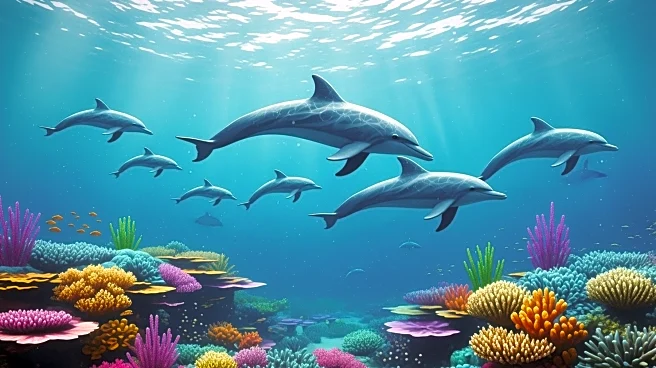What's Happening?
A recent study published in Conservation Letters highlights a significant decline in the lifespan of common dolphins in the North Atlantic. Researchers from the University of Colorado Boulder have found
that female dolphins are now living an average of seven years less than they did in 1997. This decline poses a threat not only to the species but also to the ocean ecosystems they support. The study focused on dolphins in the Bay of Biscay, a key winter habitat, where bycatch from fishing operations has been a major cause of dolphin mortality. The research team used stranded dolphins to assess population health, revealing a decrease in average lifespan from 24 years in the late 1990s to 17 years by 2019. This has also led to a decline in birth rates, indicating broader reproductive challenges.
Why It's Important?
The decline in dolphin populations has significant ecological implications. As top predators, dolphins play a crucial role in maintaining the balance of marine ecosystems. A reduction in their numbers could lead to uncontrolled fish populations, which may overconsume plankton and vegetation, potentially causing ecosystem collapse. The study underscores the need for effective management strategies to prevent further decline. The French government's recent fishing ban in the Bay of Biscay is a step in the right direction, but researchers suggest that aligning the ban with dolphin migration patterns could enhance its effectiveness. The findings also highlight the importance of strengthening marine protection policies, such as the US Marine Mammal Protection Act, to safeguard these vital species.
What's Next?
To address the declining dolphin populations, researchers recommend adjusting fishing bans to better align with dolphin migration patterns. This could provide more effective protection during critical periods. Additionally, there is a call for broader policy changes to enhance marine conservation efforts. Understanding the pressures faced by other North Atlantic cetaceans, such as harbor porpoises and bottlenose dolphins, could inform future strategies. The study emphasizes the urgency of taking informed action to prevent further declines and protect marine ecosystems.
Beyond the Headlines
The study highlights the ethical responsibility of humans to protect marine life and ecosystems. The decline in dolphin populations serves as a warning of the broader impacts of human activities on the environment. It calls for a reevaluation of fishing practices and increased awareness of the interconnectedness of marine ecosystems. The research also points to the potential for long-term shifts in marine biodiversity if current trends continue, underscoring the need for sustainable management practices.










